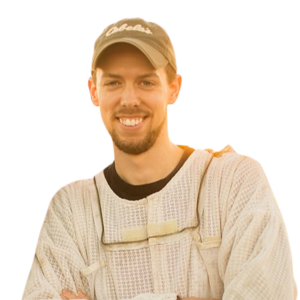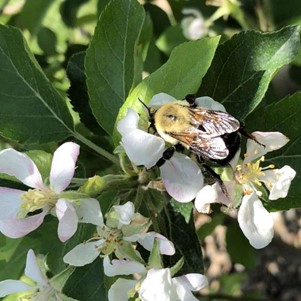By: Jennifer Berry
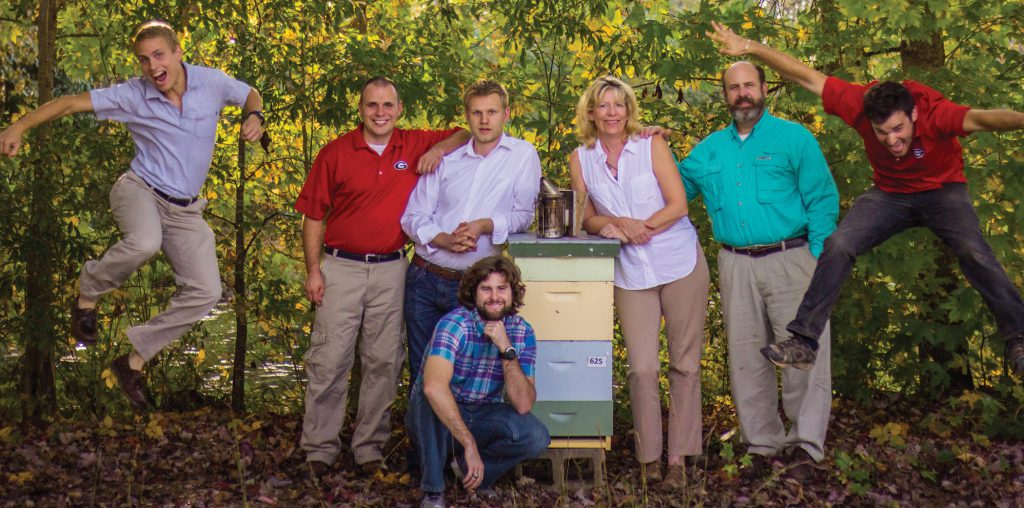
Left to Right: Jeff Garrison, Nicholas Weaver, Nathan Beach, Brett Nolan (bottom), Jennifer Berry, Phillip Quinn, Ben Rouse
Over the years, I’ve received numerous inquiries about the “behind the scenes” functioning of the UGA bee lab. In spite of my continued attempts at side-stepping in lieu of what I think would be MUCH more interesting topics for the Bee Culture audience, folks persist in wanting to know it all: the layout, process, activities, stories, etc. But, the truth be told, the ins and outs of our operations are singularly ascribed to the amazing people we have on staff who, despite all the practical challenges, scientific puzzles, and bureaucratic hurdles thrown their way, continue to pull off nothing short of minor miracles in achievement and excellence with every undertaking. To know these individuals is to have an understanding of how the lab functions, results are obtained, and departmental laurels are earned. I can’t think of a better gift to those interested than a brief yet colorful rundown of our “usual suspects!”
Dr. Keith Delaplane
Keith Delaplane is Professor of Entomology, Walter B. Hill Fellow, and Director of the Honey Bee Program at the University of Georgia. His introduction to beekeeping happened at age 13 in Indiana when his father bought a beginner’s beekeeping kit for him. It may have been prophetic that those first bees were a package shipped from Georgia. His beekeeping enterprise eventually exceeded 50 colonies, and he produced honey at semi-commercial scales in Indiana and Georgia. Following degree programs at Purdue and LSU, he joined the faculty of the University of Georgia in 1990, where he is now responsible for teaching, research, and continuing education on bee biology and honey bee management.
Keith’s research and his students focuses on pollination and sustainable honey bee health management. The centerpiece of the program’s outreach efforts is the Young Harris Institute; it has been held every year since 1992 in cooperation with Young Harris College, and it serves as the administrative stage for the Georgia Master Beekeeper and Welsh Honey Judge programs. Dr. Delaplane and his associates have distinguished themselves as researchers, lecturers, and authors on many aspects of bee biology and management. Between 2008 and 2012, Dr. Delaplane served as the National Director of the Managed Pollinator Coordinated Agricultural Project (CAP) program, a $4.1 million, USDA-funded, 17-institutional consortium of researchers and educators dedicated to reversing honey bee decline. In 2014, HM Queen Elizabeth II recognized Dr. Delaplane as an honorary member of the Most Excellent Order of the British Empire in recognition of a decade’s worth of research and educational contributions in beekeeping to the United Kingdom.
Brett Nolan
Brett Nolan is our current PhD student. Born and raised in Seneca, South Carolina, Brett’s colors are orange and purple – not red and black. He earned two science degrees from Clemson University: a Bachelor of Wildlife Biology and a Master of Entomology. While working at the Clemson bee lab during his undergraduate studies, he became interested in bees. During his graduate studies, he focused on the control of small hive beetles (Aethina tumida) in honey beehives, specifically in trapping techniques.
While working on a joint UGA-Clemson research project, Brett was introduced to our UGA Honey Bee Program, and, upon finishing his master’s degree, moved the 60 short miles to Athens to continue his education in honey bees at our bee lab. His current research focuses on the host-parasite relationship between honey bees and varroa mites (Varroa destructor). In particular, he is looking at the transmission and virulence of varroa between honey bee colonies as related to colony distance and apiary density. In addition to his own studies and research, Brett regularly makes time to help with general fieldwork, lab work and brainstorming sessions.
Brett is married to Emily Nolan and has three daughters: Lucy, June, and Camille. His hobbies and interests involve being outdoors: hiking, camping, fishing, and hunting. In his younger years, Brett played soccer; today, he coaches his five-year-old daughter’s soccer team. And, when he can get a break from the harsh schedule of graduate school, he enjoys grilling or smoking anything on the barbie and deep-frying delicious, dry-rubbed turkeys. Along these lines, over the years, Brett has spoiled our taste buds here at the lab with an assortment of tasty treats. Brett is an all-around, exceptional member of our team and, when the time comes to move on (graduation), will be greatly missed.
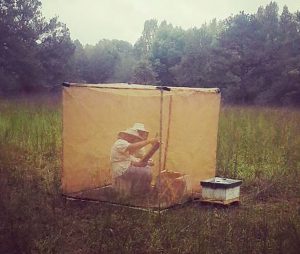 Nicholas Weaver
Nicholas Weaver
Nicholas began working with the University of Georgia in the Summer of 2007 while an undergraduate at Gainesville State College. In 2012, he became the full-time project supervisor and is now responsible for over 300 colonies maintained by the University.
Born and raised in Georgia, Nicholas has always been interested in agriculture. He began keeping honey bees at his parents’ home in Cumming, Georgia at age 13 when a family friend introduced him to the hobby. Shortly after he began keeping bees, Nicholas attended his first Young Harris Beekeeping Institute, where his interest in honey judging and beekeeping certifications began. At the time he received it, Nicholas was the youngest person in the world to have achieved the Welsh Honey Judge certification. He also earned the highest score of anyone to take the GA-MBP Master Beekeeper written exam.
A strong advocate for honey bees, Nicholas gained attention in his hometown when the local code enforcement office cited him for having hives on his property. His story was published on local, state and national news, and an online petition in his favor received over 2,500 signatures from all over the world. Nicholas gathered supporters and honey bee advocates from throughout the state to attend public hearings with the Board of Commissioners in Forsyth County, resulting in a vote to allow honey bees – without any restriction – in every zoning district throughout the county.
At home, Nicholas maintains a few hobby hives with his four-year-old son, Zachary, whom he hopes will become the youngest person to ever pass the GA-MBP Certified exam. He also performs structural and swarm removal jobs in the northeastern Georgia area, and is available for presentations and honey judging to local bee clubs.
When Nicholas first started at the lab, he would adorn himself with a full bee suit including what we call, big boy gloves. But, now, when working bees, he’s out there with just a veil and short sleeved shirt. He’s come a long way from when I first met him; he is now a husband, father, and worker the lab could not live without. He consistently proves himself through his work ethic and is truly respected by his staff. I hope that we (the bee lab) will have him on board forever.
Ben Rouse
Ben is our lab tech II here at the bee lab and aids in both lab and fieldwork. Born in Alpharetta GA, Ben became an eagle scout and member of the Phi Beta Kappa honors society. After high school, he ventured to Brigham Young University to pursue degrees in both public relations and psychology. Seeking a change in environment, he later returned to the southeast to finish his degrees at UGA, where his focus shifted to the broader perspectives of sociology with the idea of becoming a professor and writing on the topic of “the chemical society.” Since graduating in May of 2011, Ben has also taken a strong interest in honey bees. He has chosen to balance this new interest with his long-term passion in art; this is particularly noticeable in much of his recent artistic work that captures aspects of his experiences here at the lab. He has developed a duality of raising public awareness of bee decline though the fine art world. He recently exhibited his work in New York and hopes to pursue art on a full time basis one day.
Ben came to work for us without the slightest idea of what he was about to get into. Within the first week, he had been stung so many times that I didn’t think he would stick with it, but he did. I attribute this perseverance to Ben’s attitude; he is one of those folks who never has a bad day. Through Ben’s proverbial lenses, the sun is always shining and his glass is always half full. Working with him just puts a smile on your face each day. Ben is very talented, and I know that his future lies in painting and photography. It will be a sad day when he moves on to become famous. But, at least I’ll be able to say “I knew him when he was just one of us at the lab….”
Philip Quinn
Philip Quinn is a certified GA Master Beekeeper from Atlanta, GA. He maintains multiple apiaries in the Atlanta Metro and Athens areas made up largely of feral bee colonies. He obtains these regularly by carefully removing live bees from homes, offices and other buildings through his private company, Quinn Environmental.
Philip is a two-term past President and “2011 Beekeeper of the Year” of the Tara Beekeepers Association in Forest Park, GA. He is a current member of the Georgia Beekeepers Association and Eastern Apicultural Society. Over the years, he has presented various public beekeeping courses and workshops, and is a highly regarded instructor at our annual UGA-Young Harris College Beekeeping Institute. He also speaks to beekeeping clubs, garden clubs, schools and other groups on various honey bee, beekeeping and pollination-related topics.
At the UGA Honey Bee Lab, Philip manages our website, edits and contributes to professional publications, compiles and analyzes research data, as well as develops and administrates project management software. His other duties include coordinating the annual UGA-YHC Beekeeping Institute, grading the associated Georgia Master Beekeeper certification exams, and maintaining the historical GA Master Beekeeper records. Philip works in the apiaries on large-scale initiatives such as queen rearing, moving bees, splitting hives and setting up new research projects. He has contributed directly to the collection of research data over the years through fieldwork and lab work, including dissections and microscopy.
Philip is one of those people who, when you hand him a job, will not only get it done, but will do it very well. He is one of the most conscientious people I know when it comes to his work and it shows, which is probably why we rely on him for so much. Philip also has a wicked sense of humor and a deep, hearty laugh, which are greatly appreciated here at the lab. Now, if we could only get him to move from Atlanta to next-door-to-the-bee lab, we would be able to get him to do even more stuff for us!
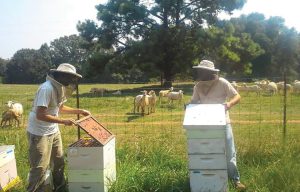 Nathan Beach
Nathan Beach
Nathan was born in Maryland. He spent his childhood in Texas and his young adulthood in South Carolina. His interest in honey bees was sparked at a young age. While in England, his family visited an apiary, where little Nathan observed bees at work in an observation hive and learned about all the beneficial products and services bees provide to humans. After that experience, he knew that he wanted to become a beekeeper – at least as a hobby. At age six, he tried to start a bee colony by baiting bees into a jar with honey, but all he caught were yellow jackets. While that experiment might have failed, he has come a long way in his knowledge of bees since then.
Later, Nathan saw a beekeeper’s exhibit at the state fair and his beekeeping desire grew. After moving to South Carolina and attending a beginner beekeeper course hosted by the Aiken Beekeepers Association, he and his mom started their first hive. Nathan joined the association and, after about a year, was elected Secretary; he helped to revise their newsletter and establish their website. He next served as vice president for two years. During this time, he ran two beginner and one intermediate beekeeping courses. He was awarded the SC Junior Beekeeper of the Year award for his efforts.
Nathan put his beekeeping endeavors on hold while he attended Bob Jones University and received a Bachelor of Science degree in Business Administration. He worked for two years at a marketing agency in Greenville, SC. In the Fall of 2013, he married his best friend, Tori. The following year, he sensed that the “ad man” life was not what he wanted, and he started exploring opportunities to work with bees again. Nathan has recently joined the UGA Bee Lab, and, from what I have seen, shows great potential for a successful entomology career!
Jack Garrison
Jack is our resident student worker at the bee lab and assists with just about everything that needs to be done, from making sugar syrup and assisting in the fieldwork to counting mites on sticky screens and other lab duties. Jack hails from Madison County, GA. He grew up on the family chicken farm; so, hard work is not a foreign commodity to him. Currently, he is enrolled at North Georgia University as a Biology major, but he looks forward to transferring to UGA and completing his scholarly pursuits here. If we can have our way, he will soon be a graduate student here at the lab!
The work with honey bees appeals to Jack’s interest in Biology and has proven to be a valuable scientific experience for him. When not working, going to class, or studying Chemistry, his time is spent outdoors: biking or backpacking the many trails in the Appalachian Mountains. Jack finds peace and relaxation in the highlands. He also enjoys wakeboarding and other watersports.
I actually met Jack while he was working as a cashier at Publix supermarket. He asked what I was up to. You know – it was the typical grocery checkout aisle chitchat. When I told him that I work with honey bees, his eyes lit up and a cascade of questions followed. Eventually, the question, “How can I work there?” came up. His excitement was engaging. I told him that, by coincidence, we were looking for more help at the lab, and, if he was interested, he should give me a call. Two days later, we hired him. Jack is eager and energetic. We are lucky to have added another team member with true passion for honey bees.
Trey Watkins
Trey is a senior at Madison County High School, the middle linebacker for their football team, and also a member of their track team. Upon graduation, he plans to enlist in the United States Navy, where he hopes he’ll have the opportunity to try out for the Navy football team. Trey’s other passion is engineering, and he plans to pursue a degree. We’ve tried over the years to sway him toward entomology, but his heart just isn’t in it. I suppose that engineering will be ok, too.
This past Summer was Trey’s second year working at the bee lab. He’s a neighbor of mine, and he started working for me on my bee farm years ago. I noticed quickly that he was a hard worker. He showed up on time and didn’t sit around toying with the cell phone (not my typical experiences of teenagers…). That’s why I asked him to come to work at the UGA bee lab over the Summers. Self-initiative, which Trey has lots of, is very important around here since there is so much going on each day. Hopefully he’ll be able to work for us one more Summer before he ships off towards his future.
Jennifer Berry
Bees weren’t always in my life, but, if I had been paying attention back in high school, maybe they would have entered much earlier. My first “real” job was at Burger Queen in the thriving and booming, tomato growing metropolis of Ruskin, Florida. Burger Queen was the first fast food diner to arrive in town. Hence, every high school kid wanted to work there. When I first applied, I was too young. So, once 15, I reapplied and got a job. The manager informed me to arrive first thing Saturday morning and to be ready to take on the breakfast rush.
Ruskin is a small town south of Tampa Bay with a disproportionate representation of retired folk. So, on weekends, the biscuits and gravy plate was a huge success. The fried chicken plate was the hit on Wednesdays. And, of course, practically everyone asked for the senior citizen discount. Anyway, I was so excited to start my new job. I couldn’t wait to wear that gaudy, orange and white polyester uniform with matching garrison cap. I envisioned all my friends seeing me at the cash register or dropping a basket of fries into the deep fryer. But if I was lucky and the stars lined up perfectly, I might just be given the best job of all: the drive-thru window operator! Not only did you get your very own station, with a sliding window and cash register, but, coolest of all, you got to wear the fab headset. The drive-thru person was queen for the day. Unfortunately, I became a different kind of queen.
Since the stars did not line up perfectly, or even show up for me that first day (actually, my first week), I was denied work at the counter, deep fryer, or the window; instead I spent it inside the “Burger Queen Bee” mascot costume (complete with a large, plastic, suffocating, honey bee head, with a gold crown, and a pair of wobbly antennae, a furry, oversized, barrel-shaped bodice, yellow and black tights, and huge, clown-like, black shoes). No, I’m not making any of this up. Yet, the worse part of all was the attached gold tipped stinger. Really?!?
As I adorned myself with ridiculousness, the other employees attempted to console me by saying that this was a regular “right of passage for ‘newbees.’” Everyone, at some point, had to wear the costume. So, long story short, I guess that you could say that my first job DID actually have “something” to do with bees – since I was one, standing on the side of a busy highway, in full sun, in Florida, in a ridiculous costume, praying people didn’t recognize me as I waved at the multitude of cars driving by. Oh, the shame of it all…
Eventually, I graduated from high school, left Florida and tried my hand at acting in college and afterward. After my Hollywood dream was crushed (another story for another day), it was back to school for me, and I found my way to UGA. I entered graduate school and joined the bee lab. What can I say? I love my job. Not only do I get to work with bees every weekday at the university and every weekend with my queen-rearing and nuc business, but I also get to work with the awesome crew I’ve just introduced you to. And, when I get to travel out of the county, state, or country to speak to earnest entomologists and beekeepers, life is good. So, I guess the stars did line up for me; it was just not on burger alley or Hollywood Boulevard, but instead in the bee yard.
Be good to you and your bees!
Jennifer Berry is the Research Director at the University of Georgia Honey Bee Lab.




